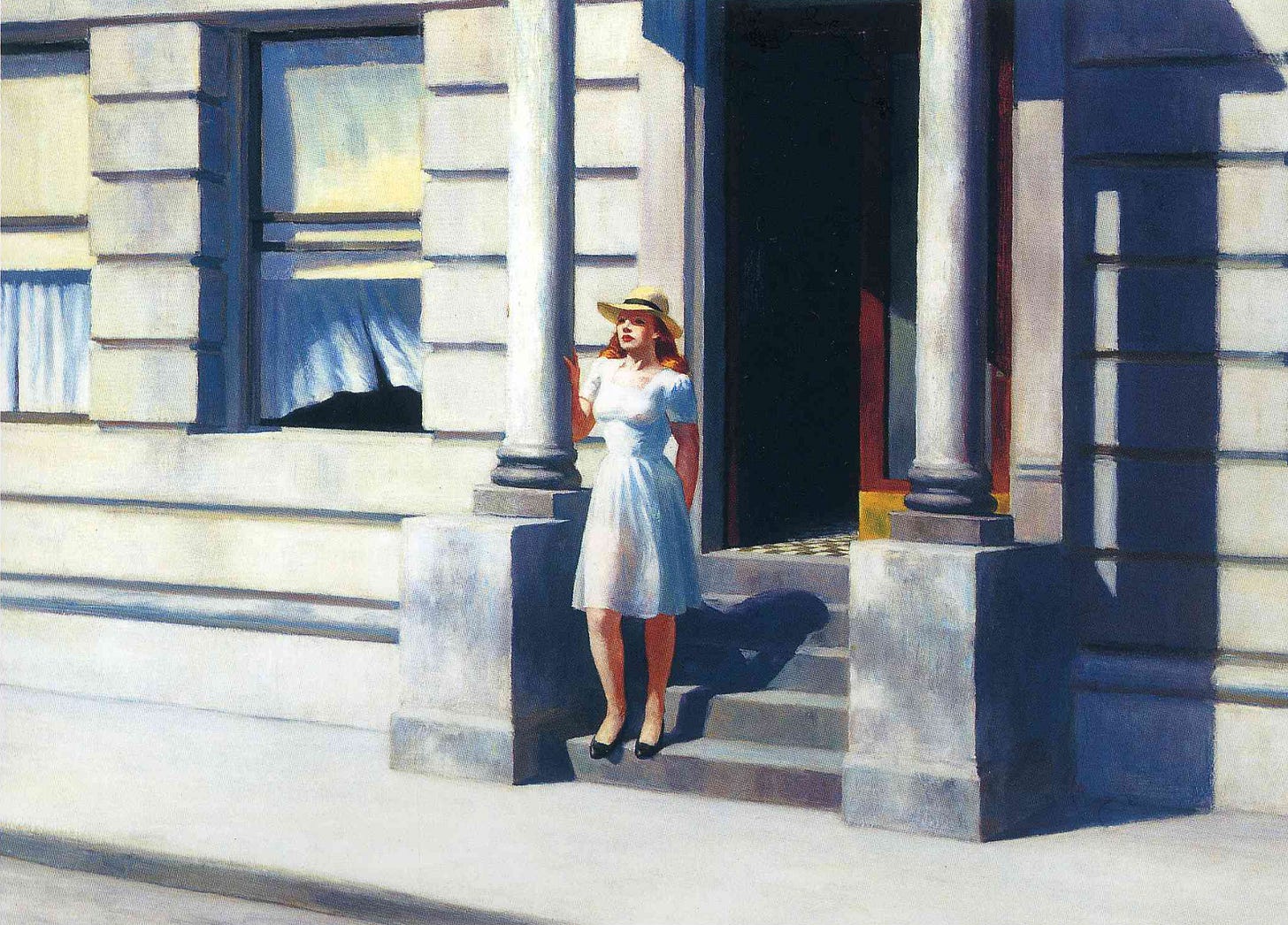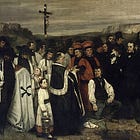CV. Against Falling in Love
Love can be a dangerous emotion.
P.S: Most of you loved these previous entries on How To Deal With Toxic People and How to Process & Overcome Grief.
“Your task is not to seek for love, but merely to seek and find all the barriers within yourself that you have built against it.” – Rumi
“The salvation of man is through love and in love.” - Viktor Frankl
Love can be a dangerous emotion.
It brings people close, yeah, but it can also make us forget ourselves. When we aren’t careful, love can lead us to act in ways that go against what we believe in. We might give too much beyond our fiscal capacity to do so, say yes when we should say no - when its not to your partner's or relationship's benefit, when we ignore bad behavior, neglect caring for our body and mind, or lose focus on our purpose and duties in life. It’s what ancient writers like Ovid warned us to be careful about - that falling in love can undermine and sweep away our capacity for reason.
It’s easy to forget, soaking in the ecstasy of passion, that love should never strip away your individuality. The best kind lets you be yourself. You should be ok being on your own, going on adventures by yourself, growing and trusting that there's someone waiting on you back home. Someone you’re excited to share your life with because they're cool and you like their company, not because you can't do without them. It doesn’t trap you with the constant worry that the other person will leave. Seneca wrote,
“Joy comes to us from those whom we love even when they are absent …; when present, seeing them and associating intimately with them yields real pleasure.”
But too often, we sabotage this real pleasure. One of the commonest traps is repression. After being hurt, we guard ourselves, wall off love’s expression and pretend we don’t feel anything. But emotion doesn't just fizzle out. It compacts and grows. The more we deny its expression, the denser it grows - until it erupts as jealousy, neediness, insecurity. And through this suffocation of undigested love, you get hurt again and wonder why every relationship you’re in gets a tragic ending.
It’s not too much love that’s the problem. It’s love that’s too narrowly aimed - it’s that we focus it all on one person, as if they are the only thing that matters. But that only puts too much pressure on them and on us and when our illusions get shattered because of our fairy tale idealism, we get hurt.
One person can be important, but they aren’t everything. Look around. Dig deeper. Think broader. Radiate more. The world is full of chances to love and the best thing to do is fall in love with life itself. Other people are strange and full of wonder. They have interesting peculiarities, cool talents, and are kind of funny. Children remind us of innocence and the idea of simplicity we’ve long buried. Animals are honest companions, incapable of betrayal, they fight pests and teach us unconditional love. Work is also rewarding, there's nothing as pleasurable as being in flow state, creating good work and being rewarded for it. It’s also a joy to read, understand and apply concepts that improve people's life in real time. But we can’t enjoy any of this if we declare blindness to this beauty. Seneca consoles us when we encounter a tragedy of love,
“You have buried someone you loved. Now look for someone to love. It is better to make good the loss of a friend than to cry over him.”
Don’t wait around hoping for someone to love you back, to spend time with you, if they’ve shown they never will. Don’t keep checking your phone for their message or believe being sad makes your love real. There is no prize for masochism.
The Stoics never said we should deny our emotions - they only insisted we should never be conquered by them. Feel them, yes. But remember, only one thing is worthy of our unwavering devotion - virtue. It brings us closer to eudaemonia - a life worth living. That requires apatheia - not indifference, but freedom from being puppeted by destructive passions like fear, desire, grief, and rage. When we love from this place, we become unmanipulable. We’re not slaves to love and sex - our mind belongs to us. We’re also not too excited by external things. We can take a moderate helping in the right situation, from the right person, when it’s the right time to have it. Epictetus advice us,
“What you love is nothing of your own: it has been given to you for the present, not that it should not be taken from you, nor has it been given to you for all time, but as a fig is given to you or a bunch of grapes at the appointed season of the year. But if you wish for these things in winter, you are a fool. So if you wish for your son or friend when it is not allowed to you, you must know that you are wishing for a fig in winter.”
This doesn’t mean we’ve stopped loving or have become disenchanted. Stoic love just exists in the real world. We understand that our partners are autonomous beings. They can choose to respect us, or not. They can choose loyalty—or infidelity. They might support us today and abandon us tomorrow. They could fall ill, lose their memory, or ghost us. That’s life. It’s good to reflect on thoughts such as these because, other than growing more grateful for our loved ones and savoring the fun we’re having with them right now, when we’re deprived of them, it’s not so hard a blow because it was expected and accepted gracefully. At least, in mitigating the excesses of love, we won’t face the self-destructive tragedy of the characters in Goethe’s Sorrows of Young Werther. We know nothing lasts forever. Yet, we’re not fearful, distrustful or apathetic of them right now. Seneca aptly adds,
“Let us enjoy our friends avidly, for how long this blessing will fall to our lot is uncertain.”
Romantic love becomes dangerous when it’s delusory, a refusal to accept the potholes of reality only to be swerved off-road then cry about it. When we pretend there won’t be boredom, friction, that we might lose the spark, that there will sometimes be distance and that fate might expose our partner’s undercover lover in a cold play on the Jumbotron. And other than make us worried, this should help us handle the yin and yang of love well by not making the mistake of putting all our happy eggs in this one individualistic basket.
But if our happiness and well-being lies in the practice of virtue, in being agentic — prioritizing to show and give love more than receiving it, then none of the injuries of falling in love can harm us. We’ll feel hurt for sure, we’ll grieve and we might not want anything to do with them anymore, but we’ll find our foot back again. Always. And more than make us fearful of love, we’ll always be ready to love again because we know it’s what we’re here for and we’re invincible—nothing can hurt our ability to choose love, to be the fun, seductive, social and kind human beings we were meant to be.
Related,
Did you like this entry?
What are your thoughts on romantic love and the perils of its excess?
I always enjoy hearing from you, and for you to hear from each other.
Please leave a like (❤️), tell me what you think (💬) in the comment section and share this post with someone so that more people can discover and benefit from it.
Support The Stoic Manual and access 180+ premium in-depth essays: lessons & mini-courses in the art of living, consolations for difficult times, Relationship Mini-courses, The Wealth Playbook, Leadership Skills, Social Skills and Health Tools for a virile and distinguished life. Annual/Patron members get a free copy of my book, ‘THE TOOLS’ + over 40,000 words of bonus content and a free copy of ‘THE STOIC MANUAL VOL. 1’ dropping next year.
Join 67,100 other readers,





A great article on the dangers of romantic love.
The Greeks had eight different words for the various types of love.
Romantic and erotic love are placed on a pedestal today above the other types of love: self, familial, and friends.
“that fate might expose our partner’s undercover lover in a cold play on the Jumbotron.”
I see what you did there 😆